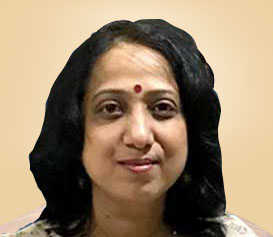Click to view article
Chair Message

Jyoti Bajpai
Women and Men oncologists:
Threads of the Same Fabric of Humanity & Cancer Care
There is evidence that women are marginalised in leadership positions all across the society, including the health quarter.Cancer is one of the lead causes of morbidity and mortality worldwide including in low-middle income countries like India. The lack of trained professionals may be one of the major reasons for increased case fatality , hence, optimal use of all the existing human resources by promoting gender equality in oncology is imperative. There is evidence in academic medicine that women not only earn less money than men but also reach the top positions less often despite having equal training and capabilities as their male counterparts.
No medical professional would consciously support gender disparity; however, the prevailing patterns, cultures and mindset lead to trifling gender biases that, over time, swell up and become significant.
We need to know the gender climate and the challenges faced by women oncologists across the nation to identify the lead thrust areas for improvement of the gender gap and then with the help of leaders in the field to findout practical solutions .
A big reason we created this Women for Oncology-India(W4o-I) initiative is to make sure that we are echoing and supporting the voices and actions of women in oncology who are doing phenomenal work amid the challenges posed.
A joint venture between various International and national Women for Oncology forums is mandatory to build a future where the entire oncology workforce has the same career opportunities, independently from factors such as gender, race or age.National lead societies like ISMPO and I-OSI, in collaboration with international committees, need to address these gender-based challenges.
There is a dire need to validate ourselves against the acquired gender equality rather than contemplated. We must keep correcting ourselves both at conscious and subconscious levels until the desired and acquired goals of gender neutrality are in parallel.